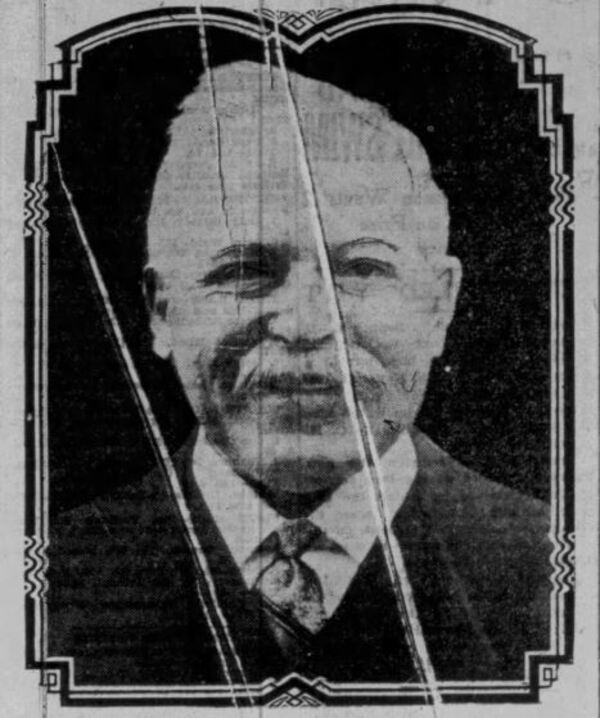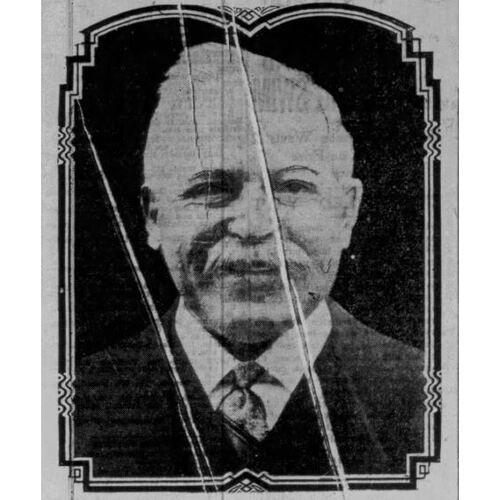
Source: Link
GOOD, HENRY JOHN PRESCOTT WILSHERE, sportsman and newspaperman; b. 22 Nov. 1848 in Solihull, England, son of John Presly Good and Clara Louisa Rogers; m. 20 Nov. 1873 Helen Mar Clute in Yorkville (Toronto), and they had three sons and two daughters; d. 31 Aug. 1927 in Toronto.
A pioneer sports leader and writer, Henry J. P. Good linked two of the principal institutions that gave Canada’s burgeoning cities their public discourse, men’s sports and newspapers. After private tuition in Shoreham and some time at King’s College in England (which King’s College is uncertain, but he was a successful rower there), he immigrated to Canada in 1869. He quickly established himself as a prominent organizer in Toronto’s flourishing sports scene and as an ambitious newspaperman. Good helped found the Canadian Association of Amateur Oarsmen in 1880 and was also closely associated with the career of professional rower Edward Hanlan*, whose matches, bets, and victory parades he arranged. One episode solidified Good’s renown. In 1882, when Hanlan defended his world championship against Edward Trickett in England, Good placed some $40,000 in Toronto wagers with London bookies. Hanlan won, but unknown to the betters was the bookies’ practice of paying out only on Mondays, in this case a full week after the race. According to Robert S. Hunter, “Mr. Good made his reputation as an orator on those horrible intervening days, endeavouring to account for his inability to pay off the speculators.” To make matters worse, newspaper colleague Philip Dansken Ross* recalled, just when Good was about to distribute the winnings at a gathering of the betters – “he had an eye for the spectacular” and wanted “to make an occasion” – an unexpected telegram arrived from Hanlan demanding a share.
In the late 1880s, as a senior member of the Toronto Lacrosse Club, Good helped shift the power in that sport from Montreal, where William George Beers* had first codified the modern game, to Toronto through the creation of the Canadian Lacrosse Association. Good served as its president in 1890–91. He was active as well in the Canadian National Bureau of Breeding Limited and the Toronto Open-Air Parade Association, both of which promoted equestrianism, and in the Canadian Bowlers’ Association.
Good had begun work in Toronto in 1872 as a proof-reader for John Ross Robertson*’s Daily Telegraph. By November 1873 he had moved to the Mail, which, since 1 April 1872, had been publishing weekly, well-informed collections of “Sporting Intelligence” on a single page. Despite the growing popularity of sports, most daily newspapers provided only brief notes scattered throughout their pages. The most extensive coverage was obtained in weeklies and monthlies such as the National Police Gazette and Harper’s, both from New York City. Good advanced at the Mail from proof-reader to reporter to night editor (1878), but he was likely responsible for the sports section from an early date, possibly even from its start. At the request of managing editor Thomas Charles Patteson he became the Mail’s full-time sports editor, North America’s first in the estimate of both the Globe and journalist Hector Willoughby Charlesworth*. Under Christopher William Bunting* the entire paper was redesigned with larger stereotyped print and organized sections throughout; it appeared in its “new shape and dress” on 2 Aug. 1880. Good’s section, “Sports and Pastimes,” contained the latest news and gossip about rowing, horse racing, baseball, rifle shooting, lacrosse, cricket, distance running, cycling, and swimming. Without bylines, which did not become widespread until after World War I, it is impossible to tell what Good actually wrote, but the style is expansive, gracious, and authoritative.
In the years to follow, Good would move from paper to paper in Toronto, sometimes serving as sports editor (Mail, 1880–83; Empire, 1889–92) or general editor (Telegram, 1884; Mail, 1887–88; World and Sunday World, 1894–95; 1897–1909), but he always wrote about sports. In 1885 he was assistant editor of Edmund King Dodds’s Canadian Sportsman and Live Stock Journal and in 1896, with John F. Snetsinger, he put out a weekly called Sport. After the turn of the century, he began writing under his own byline, first as Pop for the World and then as H. J. P. Good. About 1901, evidently as a freelancer, he joined Richard Thomas Lancefield in editing a memorial piece on Queen Victoria.
After he left the World, he tried stints in 1910 as manager of the Dominion Exhibition in Saint John and of a private venture, the Good Correspondence, Reporting, and Publishing Bureau, but he soon returned to what he did best, sports writing. During the last years of his life, he became known to a new audience as a popular historian of Canadian sport, with articles in the Toronto Star Weekly that drew on his recollections and records. Then as now, freelance writing was a precarious existence. Despite his Albany Club membership and upper-class connections, he and his family moved frequently and when he died of arteriosclerosis in 1927 he was virtually penniless. His son Charles Henry had followed him into a career in newspapers, becoming one of the city’s best known baseball writers.
Throughout his long career, Good stressed three values that have been mainstays of Canadian amateur sport: purposeful recreation, respectable masculinity, and nationalism. He promoted sports for the health, the civic virtues, and the friendships that they encourage. Despite his involvement with Hanlan, he often bemoaned professionalism as “social degradation” for participants and “physical degeneration” for spectators. He abhorred brawling in hockey and had a low opinion of boxing. Probably the most distinctive feature of Good’s writing was his Canadianism. He covered not just Ontario sports, but the prospects and achievements of athletes from the Maritimes, Quebec, and the west, and of immigrants and the First Nations. His columns were replete with suggestions for boosting home-grown talent. He regularly regaled his readers with Canadian victories abroad, and complained when outstanding athletes such as the Toronto Lacrosse Club’s star runner, George Washington Orton, went to the United States. (Orton was the first Canadian to win an Olympic gold medal, in the steeplechase in 1900, but he did so in the uniform of the University of Pennsylvania.) Success in sports was a barometer of national vitality, Good argued, and Canada should seek to become one of the foremost of nations.
Along with R. T. Lancefield, Henry J. P. W. Good edited Victoria, her life and reign (Toronto, 1901). George William Ross* provided an introduction to this book.
AO, RG 22-305, no.57572; RG 80-2-0-106, no.36618; RG 80-5-0-47, no.14276. Globe, 2–3 Sept. 1927. Mail (Toronto), 1872–83, esp. 21 Nov. 1873. Toronto Daily Star, 1–2 Sept. 1927. Toronto Star Weekly, 1923–24. Toronto Sunday World, 1900–9. Canadian Courier (Toronto), 1907–8. Canadian men and women of the time (Morgan; 1912). Canadian who’s who, 1910. H. [W.] Charlesworth, Candid chronicles: leaves from the note book of a Canadian journalist (Toronto, 1925). Directory, Toronto, 1872/73–1927. R. S. Hunter, Rowing in Canada since 1848 . . . (Hamilton, Ont., 1933). P. D. Ross, Retrospects of a newspaper person (Toronto, 1931). Paul Rutherford, A Victorian authority: the daily press in late nineteenth-century Canada (Toronto, 1982).
Cite This Article
Bruce Kidd, “GOOD, HENRY JOHN PRESCOTT WILSHERE,” in Dictionary of Canadian Biography, vol. 15, University of Toronto/Université Laval, 2003–, accessed March 1, 2026, https://www.biographi.ca/en/bio/good_henry_john_prescott_wilshere_15E.html.
The citation above shows the format for footnotes and endnotes according to the Chicago manual of style (16th edition). Information to be used in other citation formats:
| Permalink: | https://www.biographi.ca/en/bio/good_henry_john_prescott_wilshere_15E.html |
| Author of Article: | Bruce Kidd |
| Title of Article: | GOOD, HENRY JOHN PRESCOTT WILSHERE |
| Publication Name: | Dictionary of Canadian Biography, vol. 15 |
| Publisher: | University of Toronto/Université Laval |
| Year of publication: | 2005 |
| Year of revision: | 2005 |
| Access Date: | March 1, 2026 |



